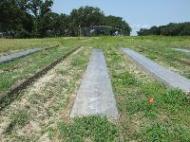Although you can grow some vegetables in Central Florida during summer, your choices are limited. Many gardeners choose to solarize their vegetable gardens during summer, because soil solarization works best during hot months. Solarization is a practice used to manage weeds, nematodes, diseases and insects in soil.
Soil solarization works by heating up the soil and killing or reducing pest populations. However, this is a temporary solution for nematodes, as nematode pests living deep in the soil will survive and can eventually move up into the solarized area. This re-invasion of the solarized soil usually takes about 3-4 months, so after that time the effects of solarization diminish.
According to the UF/IFAS publication Introduction to Plant Nematology, “preventing a nematode population is far better than trying to treat one after it is established.” Nematodes are cylindrical microscopic worms that live in the soil. They feed on living plant tissues and puncture cell walls with an oral spear-like stylet. Nematodes feed on ornamentals, vegetables and lawns.
You can decrease nematode populations by:
- choosing healthy plants
- adding organic matter (which improves soil structure and fosters natural enemies such as fungi and predatory nematodes that help control pest nematodes)
- practicing crop rotation
- propagating/taking cuttings only from uninfested plants
- choosing nematode resistant varieties and cultivars
- removing crops after harvest/season to prevent them from harboring pests
- sanitizing tools and equipment
- planting vegetables at the right time of the year based on the Florida Vegetable Gardening Guide
- planting cover crops between vegetable crops
- keeping plants healthy and making plant selections based on the Florida-Friendly LandscapingTM principle “right plant, right place”.
In addition, the Ornamental and Turfgrass Pest Management manual states: “Use mulch and organic matter. Mulch around the roots of plants to protect them from extreme temperatures and minimize water evaporating from the soil surface. Mulches also return organic matter back into the soil, which improves the soil water- and nutrient-holding capacity. Mulches also reduce stress on plants and their roots. This improves plants’ chances to tolerate some nematode root damage.” Mulching is also one of the 9 Florida-Friendly LandscapingTM principles.
At this time, there are no chemicals available for homeowners to control nematodes.
For more information, please contact the Hillsborough County Extension Service at (813) 744-5519 or by email at hillsmg@ad.ufl.edu.
References:
Introduction to Soil Solarization
http://edis.ifas.ufl.edu/in856
Solarization for Pest Management in Florida
http://edis.ifas.ufl.edu/in824
Introduction to Plant Nematology
http://edis.ifas.ufl.edu/ng006
Kinds of Nematodes
http://edis.ifas.ufl.edu/topic_kinds_of_nematodes
Florida Vegetable Gardening Guide
http://edis.ifas.ufl.edu/vh021
Florida-Friendly Guide to Plant Selection and Landscape Design
Click to access FFL_Plant_Selection_Guide.pdf
Hillsborough County Gardening Calendar
Click to access Gardening%20Calendar-Monthbymonth.pdf
Nicole Pinson
Extension Agent – Urban Horticulture
Master Gardener Coordinator
UF/IFAS Hillsborough County Extension Service
5339 County Road 579
Seffner, FL 33584-3334
p: (813) 744-5519 X 54145
nicolepinson@ufl.edu
pinsonn@hillsboroughcounty.org



